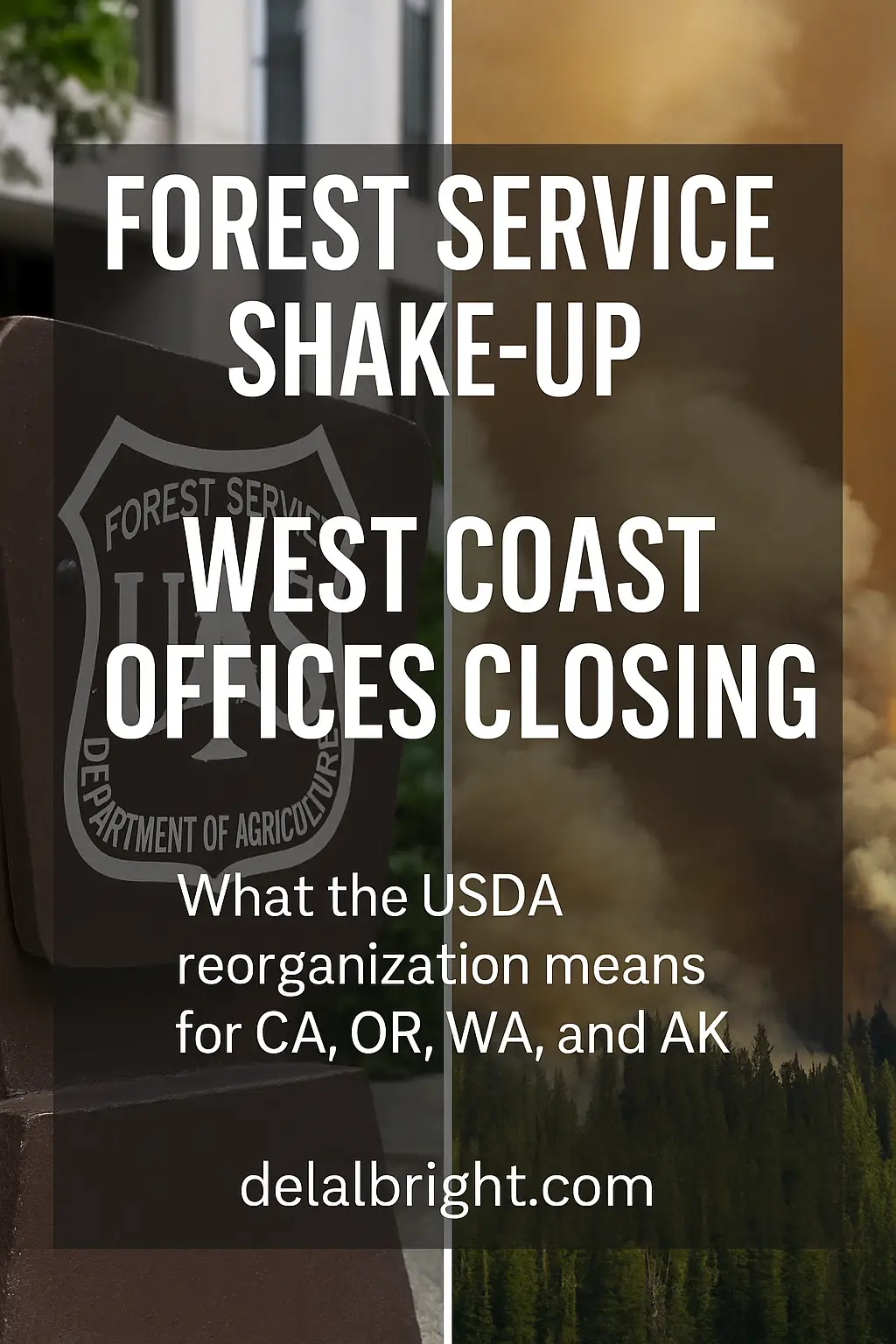Historic Shake-Up at USDA Forest Service (USFS)
The U.S. Department of Agriculture (USDA) Forest Service (USFS) has announced a sweeping reorganization that will significantly change the way the Forest Service (USFS) operates. The plan is part of a broader USDA effort to right-size the workforce, cut management layers, consolidate functions, and move staff closer to “customers.” Not everyone is comfortable with this restructuring or sure of its impact on local land use efforts.
At the heart of the proposal:
Phasing out the nine Forest Service Regional Offices over the next year.
Consolidating research stations into one hub in Fort Collins, CO.
Retaining only two major labs – the Fire Sciences Lab (Missoula, MT) and the Forest Products Lab (Madison, WI).
Reducing the Washington, D.C. footprint and shifting staff to five USDA hubs: Raleigh, NC; Kansas City, MO; Indianapolis, IN; Fort Collins, CO; Salt Lake City, UT.
West Coast USFS Offices in the Crosshairs
Region 5 – California (Vallejo HQ)
California’s regional office is slated for closure.
Oversight functions would be shifted to Fort Collins or Salt Lake hubs, hundreds of miles away.
Local research capabilities could be reduced, with staff relocated or consolidated.
Region 6 – Pacific Northwest (Portland HQ)
The Portland regional office is on the chopping block.
The Pacific Northwest Research Station in Portland is also proposed for closure, with consolidation into Fort Collins.
This means decades of ecosystem-specific expertise may no longer be locally based in the Cascades or coastal forests.
Alaska (Region 10 – Juneau HQ)
One exception: USDA says it will maintain a reduced state office in Juneau, given the unique challenges of managing Alaska’s forests.
What’s Uncertain
Will displaced staff be offered remote work, relocation, or severance?
How will USDA replace the regional functions of oversight, coordination, and partner relationships?
Will smaller “state offices” or local service centers be created, or will everything flow through the new hubs?
- What happens with local relationships that have built trust (tribes, NGOs, landuse groups, volunteer forces,etc.)?
How will long-term research programs tied to California, Oregon, and Washington ecosystems continue if local scientists are relocated?
Potential Impacts for the West Coast
| Area | Possible Impact |
|---|---|
| Local Forest Management | Slower response to cross-forest issues like fire, pests, or drought if oversight is run from distant hubs. |
| Research & Science | Loss of long-term, place-based studies and monitoring in the Sierra Nevada, Cascades, and coastal forests. |
| Fire & Emergency Response | USFS promises no disruption during peak fire season, but regional support capacity could weaken in the long term. |
| Partnerships | State, county, tribal, and NGO partners may struggle with reduced face-to-face access to decision-makers. |
| Economics | Vallejo and Portland communities could lose high-paying federal jobs and related local contracts. |
| Institutional Knowledge | Risk of losing experienced staff who may choose not to relocate. |
| Access for Rural Communities | More barriers if oversight and permitting processes are centralized out of state. |
Supporters vs. Skeptics
USDA’s case: Consolidation will cut costs, streamline decision-making, and move jobs to more affordable locations.
Skeptics’ concerns: Reduced capacity for wildfire coordination, weakened research, slower response times, and loss of local relationships with partners and stakeholders.
Congressional Oversight: Lawmakers from Western states have already questioned the impacts, and hearings are underway.
Where It Stands
The public comment period has been open for stakeholders, counties, tribes, and organizations to weigh in. Final decisions will follow that review process, with implementation phased in over the next year.
For the West Coast, it’s clear this reorganization could reshape the Forest Service’s footprint for decades to come. The future of local research, emergency coordination, and community partnerships hangs in the balance.
Takeaway
The Forest Service reorganization is one of the biggest structural changes in the agency’s history. For California, Oregon, Washington, and Alaska, the loss of regional offices in Vallejo and Portland would be a major shift in how the West’s forests are managed. While USDA promises cost savings and efficiency, many in the West worry about losing the close-knit, on-the-ground capacity that has defined the Forest Service for over a century.
What do you think this reorganization will mean for our forests, fires, and communities here in the West? Leave your thoughts below.
MORE on Getting Involved in Land Use.
MORE on Writing Letters to Government Agencies.
USFS Chief Explains Reorganization Plan



